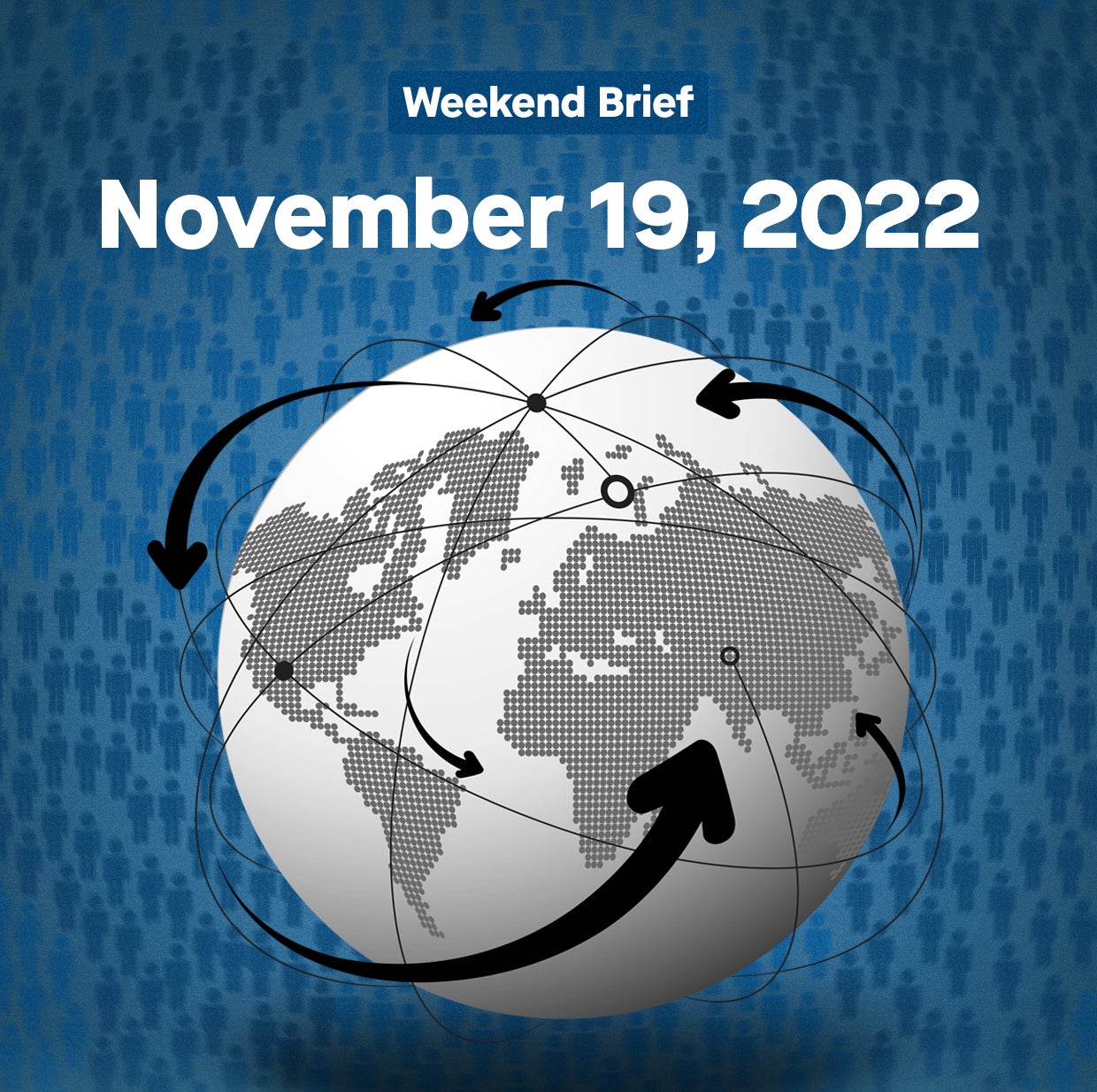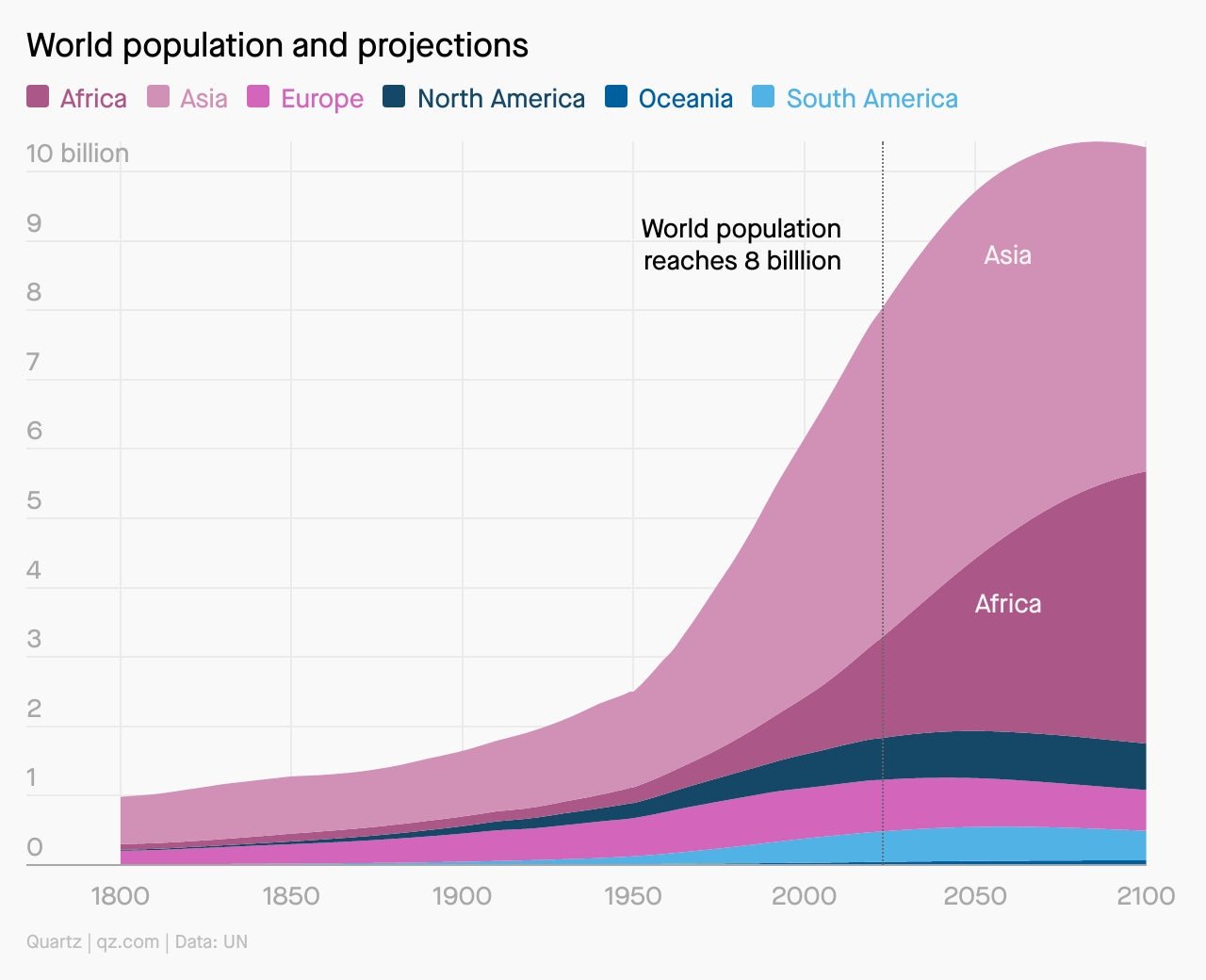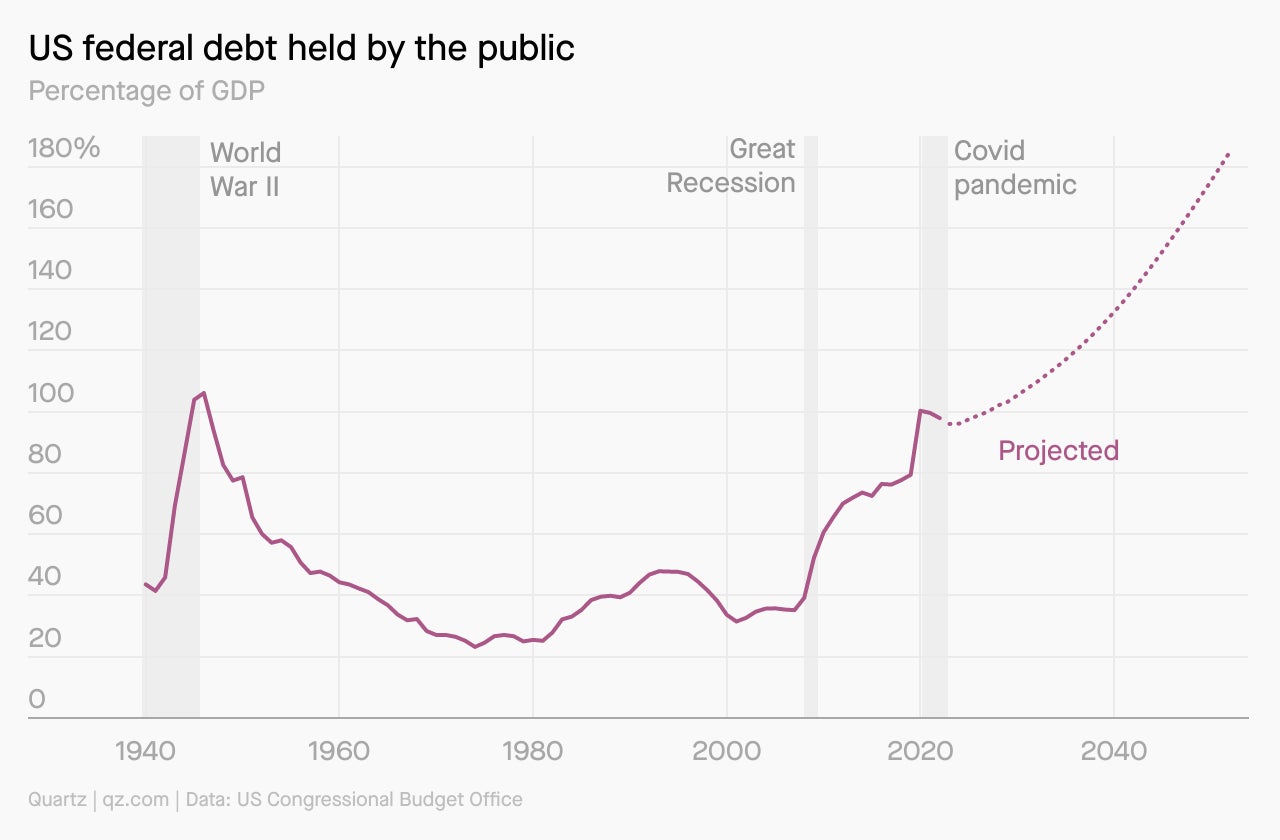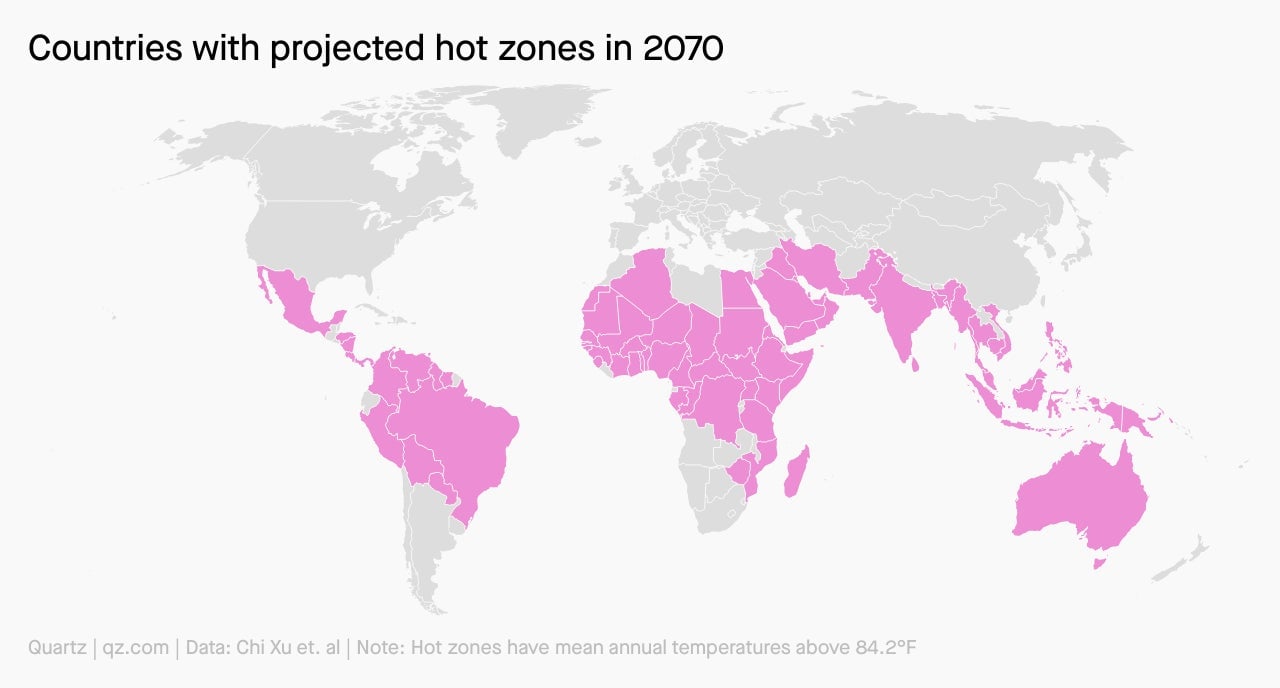The 8-billion-person planet
As the world population climbs toward a peak of 10.4 billion, what happens to the global economy?


Hi Quartz members,
In the early, early hours of Nov. 15, in a Manila hospital ward, a baby girl was born to an unusual reception: officials from the Philippines’s Commission on Population and Development standing by, with a cake and a banner, ready to herald her as the 8 billionth person on the planet.
That status isn’t official. The United Nations has yet to confirm that this particular baby, Vinice Mabansag, is the bearer of the title. (There is at least one other contender: an infant born the same day in the Dominican Republic.) The title is symbolic, in any case. Even the UN’s identification of Nov. 15 as the day the world’s population crossed 8 billion is largely a formality—a choice drawn from a rough demographic projection.

Even so, the number bears an enormous psychic weight. At a time of shortages of everything—energy, semiconductors, baby food, housing—it’s tempting to think that any growth in population is cause for high alarm. But to go by that headline number alone would be to miss both the larger picture and the finer details.
Growth is, in fact, slowing; this year, the world’s population went up by just 0.8%, whereas in the 1960s, it was rising three times that rate every year. At the present rate, we can even spot a peak to the world’s population: 10.4 billion or so, arriving some time between 2080 and 2100, before the number starts to decline.
If there are reasons for concern, they lie in where populations are growing and declining, says Manoj Pradhan, who founded Talking Head Macroeconomics, a research firm in London, and is co-author of a book called The Great Demographic Reversal. Pradhan points out that the big demographic dividends—the surges in working-age populations—will come in countries that aren’t yet driving the world economy.
The demographic drag, on the other hand, is unfolding in “the economic superstars, if you will,” Pradhan says. This will likely have huge effects on how our economies and societies function in the next 100 years.
BY THE DIGITS
10.4 billion: Level at which the UN predicts that the global population will peak around 2080
2.1: Average births per woman expected by 2050, down from 2.3 in 2021
61: Number of countries whose population is expected to shrink by 1% or more between 2022 and 2050
41-42: Expected median age of the world population by 2100, up from 21 in 1970
1.2 billion: Estimated number of climate refugees by 2050
180%: Size of US federal debt as a share of GDP by 2050, up from 100% now
380 million: Estimated number of Chinese people between the ages of 15-64 in 2100, down from nearly a billion in the mid-2010s
PAYING THE PIPER
By the time little Vinice Mabansag is a senior citizen, the world will look like a very different place. This is particularly true of the world’s most prosperous nations: China, the US, and European countries. Their populations of retirees will swell, but their workforces—and, as a result, their tax revenues—will contract. And that presents an economic problem. How will these governments pay pensions, welfare, and healthcare costs for the old, even as they have fewer younger people to tax?

Inevitably, the governments of aging nations will have to take on more debt, so they can support their older citizens. The US Congressional Budget Office, for instance, projects such a steep rise in debt between now and 2050 that pandemic debt looks like a mere bump by comparison. And to support all that debt, these societies will, in all likelihood, have to accommodate higher levels of inflation.
HOT AND CROWDED
Among developing countries, the nine with the biggest populations in 2100 will be: India, China, Nigeria, Pakistan, the Democratic Republic of Congo, Ethiopia, Tanzania, Indonesia, and Egypt. Even as early as 2070, eight of these nine countries will have many “hot zones”—areas where mean annual temperatures are above 29° C (84.2° F). Daily life without cooling technology will become extremely difficult, access to water will be scarce, and disruptions to agriculture will be severe.

In these circumstances, migration will become inevitable, with millions of people leaving their overheated villages and cities in search of a kinder climate. Just as inevitably much of this migration will run northwards—from South and Central America to northern North America, for instance, or from Africa and the Middle East toward Europe.
This could be a gift-wrapped solution for the wealthier countries of the north, where the populations will have grown older, and where governments will be rapidly running out of workers to tax. Migrants can fill out the thinning ranks of the labor force—as long as the political will to accept them exists.
Immigration policies will creep closer and closer to the center of political conversation in the developed world. In the near term, any moves to encourage immigration will be unpopular, said Pradhan. The kind of nativism found in Donald Trump’s America, or in the Brexit referendum, or in other swings to the right in Europe, are ready examples of anti-immigrant sentiment. “So we will definitely feel the ill-effects of this first,” Pradhan said. “But even if politics is a little unstable for the near future, I have no doubt that, in the long term, people will begin to see immigration as the great benefit it can be.”
ONE 👶 THING
The UN began identifying symbolic “billionth babies” in 1987, when it picked Matej Gašpar, born in the Croatian city of Zagreb, as the 5 billionth human on the planet. (The UN’s somewhat-inscrutable logic for choosing Zagreb: the 14th World University Games were being held in the city at the time.) The 6 billionth baby, Adnan Mević, was born in Sarajevo, not far from Zagreb.
For the 7 billionth, the UN demurred: It didn’t want to continue making these arbitrary choices, a spokesperson said. Still, several other countries and institutions made their own picks: one baby in Sri Lanka, another in Bangladesh, another in the UK. One nominee, though, is worth noting: Danica May Camacho, born in Manila—in the very same hospital where Vinice Mabansag was declared as the 8 billionth baby this past week. If ever there was a hospital alert to demographic milestones, the Dr Jose Fabella Memorial Hospital is it.
QUARTZ STORIES TO SPARK CONVERSATION
- FTX bankruptcy filing reveals a remarkably convoluted corporate structure
- How to stay up all night the NASA way
- Bill Gates pledges 5% of his wealth to Africa’s health and agriculture
- Skyroot launches India’s first privately built rocket into space
- For Africa to prosper, Africans need to be able to move
- Qatar’s $200 billion splurge will be hard to justify when the World Cup ends
- Mackenzie Scott just became America’s 4th-most-generous philanthropist, vaulting ahead of Mike Bloomberg
5 GREAT STORIES FROM ELSEWHERE
🧽 Sponge cities. Yu Kongjian, a Chinese architect, wants to make cities more climate resilient. After Beijing flooded in 2012, he began pushing the government to build “sponge cities,” which are engineered to better absorb heavy rainfall through a combination of natural areas and open spaces. Now, the “sponge city” model is being trialed across China, The Associated Press explains, but implementation has been far from smooth.
🗣️ The last babble. An estimated half of the world’s 7,151 languages will have their last word spoken before 2100, with many disappearing due to systemic removal. A detailed timeline from e-flux, starting in the 14th century, lends a new frame to the history of nationalism and colonial conquest through its documentation of “language politics.” For those who like reading about lesser known parts of history, this record is a treasure trove.
🌄 End of an era. With giants like Meta and Microsoft cutting their workforce, and Musk-led Twitter running towards the edge like a lemming, tech is having a rough year. It could mark the end of a tech epoch. According to Full Stack Economics, the industry has evolved, maturing and growing saturated over the past 20 years. Silicon Valley may be entering a new belt tightening era where it will shift its focus from growth to profits.
⚽ Shooting for gold. Known as “the beautiful game,” football (or soccer, to Americans) is also caught in the rather uglier net of trying to turn a profit. This year’s World Cup, set to kickoff this weekend, has been haunted by allegations of bribery between host Qatar and governing body FIFA in an event that has cost billions of dollars and relied on exploited migrant labor. The Economist looks at how the global match over money is playing out.
✍️ Yours sincerely. In an age where firing off a “Tks!” over text takes only a second, a handwritten thank-you note may be even more impactful. The New York Times talks to social etiquette experts who assert, contrary to what the digital herd might think, that showing gratitude by putting pen to paper is far from passé. Advice givers also say you don’t need to belabor the task—even a three-sentence note can suffice, and the gesture will be appreciated.
Thanks for reading! And don’t hesitate to reach out with comments, questions, or topics you want to know more about.
Have a totally unpopulated weekend,
— Samanth Subramanian, global news editor; Ana Campoy, deputy finance and economics editor; Amanda Shendruk, senior reporter; Clarisa Diaz, reporter.
Additional contributions by Julia Malleck